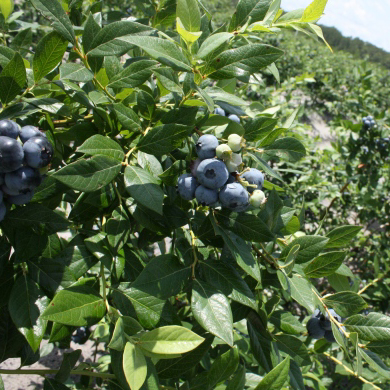Blueberry Plants and Bushes - Growing Advice and Tips
 Blueberry Plants and Bushes are delicious and contain many healthful vitamins and antioxidants, making them a tasty and beneficial addition to any home garden. They can be tricky to grow, however, depending on the traits of the soil where you live. If your soil isn't suitable, blueberries also make terrific container plants.
Blueberry Plants and Bushes are delicious and contain many healthful vitamins and antioxidants, making them a tasty and beneficial addition to any home garden. They can be tricky to grow, however, depending on the traits of the soil where you live. If your soil isn't suitable, blueberries also make terrific container plants.
General Blueberry Growing Tips
For the best chance at success with blueberries buy a plant that is at least 2 years old. Since they don't begin to fruit for at least three years, this will also save time and provide you with a blueberry crop much sooner. Blueberry bushes are extremely fussy about the soil they're planted in. If your soil isn't quite up to snuff, there are a couple of ways to remedy this situation.
·pH Levels - The optimum pH level to grow blueberries in is 4.5. If your soil is higher than that, you'll want to add ammonium sulphate to lower the pH level. Follow the directions on the product packaging to calculate the amount needed for your growing space, and work the sulphate into the soil at least 6" deep. (Ericaceous compost can be an easier option by incorporating into the soil before you plant your blueberries.)
·Alternatively keep the young plant in pots, well drained, for the first few years which will control the ph of the soil and then plant out, again, using ericaceous compost well mixed in the compost / soil)
Organic Matter - Actively decomposing compost in the soil is another necessity for successful blueberry planting. Add your own compost, grass clippings, leaves, or manure to the soil and mix it in well. You should end up with a soil mix that is at least 5% organic matter.
Some other things to consider when growing blueberries are:
- Sunshine - Blueberries thrive best in full sunlight.
- Watering - A consistent supply of water is best for blueberries, with optimal levels of 2" per week of water. Choose a well-drained soil to avoid water pooling at the base of the plant.
- Fertilisers and Compost - The best fertiliser is a rhododendron / azalea mix for NH3 N. Blueberries cannot use certain fertilisers especially tomato feed. Do not try to fix a problem with fertiliser, and do not over fertilise. There should be no fertilising after 4 July annually.
- Mulch - A thick layer of mulch will help deter weeds and hold moisture for your blueberry bushes. Add more as required to keep mulch at a depth of about 4".
- Pruning - You won't have to prune your blueberry bush at all for the first four years of its life. After that, remove any dead branches or stalks, and trim back any shoots that are very tall. When branches are overloaded with fruiting buds, the resulting berries can be small and bitter. To avoid this, prune the shoots so that they don't have more than five or six buds each. As the bushes spread and grow, you can thin them out and replant the newer shoots.
Growing Blueberries in Containers
If your soil conditions aren't right for blueberry plants but you still want to add them to your garden, you can grow blueberries in containers with great success. The process is simple, too.
- Containers - Your containers should be big enough to contain the root system of the bush, and provide some room to grow. For smaller bushes, a 2 gallon container will be fine; for larger plants, upgrade to a much larger container.
- Soil - A mixture of high-acid potting soil (ericaceous) and peat moss is a good start for blueberry plants.
- Planting - Fill the container with a layer of packed soil mixture. Add your blueberry bush and continue adding the soil until the pot is full. Make sure the entire root system is covered.
- Watering - Check your plants often to make sure the soil hasn't dried out, and water as needed.
- Fertiliser - The best fertiliser is a rhododendron / azalea mix for NH3 N. Blueberries cannot use certain fertilisers especially tomato feed. Do not try to fix a problem with fertiliser, and do not over fertilise. There should be no fertilising after 4 July annually. (Follow instructions on the packaging)
- Place your potted blueberry bushes in a sunny location, or move them around in your garden to maximize sun exposure. Prune them as directed above, and add compost as needed

